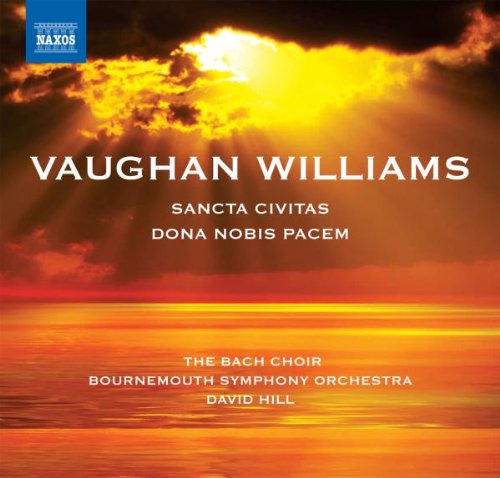Vaughan Williams Sancta Civitas; Dona nobis pacem
Vaughan Williams’s hauntingly prescient choral works from the mid-1930s
View record and artist detailsRecord and Artist Details
Composer or Director: Ralph Vaughan Williams
Genre:
Vocal
Label: Naxos
Magazine Review Date: 5/2010
Media Format: CD or Download
Media Runtime: 65
Mastering:
Stereo
DDD
Catalogue Number: 8 572424

Tracks:
| Composition | Artist Credit |
|---|---|
| Dona nobis pacem |
Ralph Vaughan Williams, Composer
Bach Choir Bournemouth Symphony Orchestra Christina Pier, Soprano David Hill, Conductor Matthew Brook, Baritone Ralph Vaughan Williams, Composer |
| Sancta civitas |
Ralph Vaughan Williams, Composer
Andrew Staples, Tenor Bach Choir Bournemouth Symphony Orchestra David Hill, Conductor Matthew Brook, Baritone Ralph Vaughan Williams, Composer Winchester Cathedral Choristers Winchester College Quiristers |
Author: John Steane
Though a period of 10 years separates the two works in date of composition, they have such affinity that it is as natural to think of them together as it is for them to be paired in recording. That Sancta Civitas is called an oratorio and Dona nobis pacem a cantata must be something of a technicality: the distinction between a wholly biblical text and one which incorporates words by a poet and a politician. Whitman’s verses inspired by the American Civil War and John Bright’s “angel of death” referring to the Crimea have also in common the harrowing disturbance of what seemed to so many a settled time of peace. Invoked in the mid-1930s, they have – particularly in retrospect – a dreadful prescience about them. And it is not fanciful to hear in the awed and sometimes fearful tones of Sancta Civitas the echoes of that other war which so haunted Vaughan Williams’s generation and of which they so rarely spoke.
These performances under David Hill are fine, responsive to the beauty and the terror. Comparing the recordings with the same coupling made in 1992, Richard Hickox conducting, one may find no compelling reason to exchange the one for the other, though preferences do arise in favour of each. The new Dona nobis pacem has the stronger initial impact, with the timpani’s sudden fortissimo striking like the first bomb over a sleeping city. The forward orchestral presence places the chorus at a slight disadvantage, and the words are somewhat easier to follow in the earlier recording. That also benefits greatly from Bryn Terfel’s singing of the baritone part, warmer in humanity as well as tone than Matthew Brook’s. Hill’s other soloists, Christina Pier and Andrew Staples, do well (though the mind goes back to the soprano of the first performance in 1936, Renée Flynn, who with a voice of comparable lyric quality infuses an element of dramatic authority). There is perhaps not much in it, but these performances under David Hill impress as more impassioned than Hickox’s and the recorded sound has a keener range and depth of perspective.
Discover the world's largest classical music catalogue with Presto Music.

Gramophone Digital Club
- Digital Edition
- Digital Archive
- Reviews Database
- Full website access
From £8.75 / month
Subscribe
Gramophone Full Club
- Print Edition
- Digital Edition
- Digital Archive
- Reviews Database
- Full website access
From £11.00 / month
Subscribe
If you are a library, university or other organisation that would be interested in an institutional subscription to Gramophone please click here for further information.




